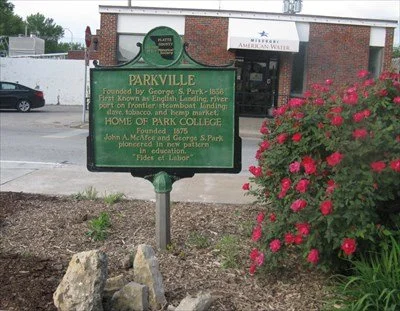Parkville’s Diversity and Inclusion Commission met earlier this month, tackling what to do with two historical markers removed in 2020.
Commission chair Rondale Dunn led the Monday, Jan. 10 meeting virtually due to COVID-19 precautions, with alderman Brian Whitley serving as the board of aldermen liaison to the commission.
City administrator Joe Parente outlined what is known of the history of the two markers removed in 2020. Both, including one donated by the Sons of the Confederacy, contained poorly-worded references to slavery in Parkville. The other sign was a gift from the Platte County Historical Society. Parente said the city had received complaints from time to time, but the matter came to a head in the summer of 2020 in the wake of the George Floyd murder in Minneapolis, Minn. The signs were removed due to complaints, and to prevent their possible vandalism.
The signs are in storage, he said, and now the city needs to decide what to do with those signs and how to move forward with commemorating the history of Parkville with racial sensitivity. Returning the signs to the organizations has been discussed, but no decision was ever made.
Board members suggested bringing in the NAACP (National Association for the Advancement of Colored People) to consult on the situation. There were opportunities to present the history of the area – both positive and negative – in a more sensitive way, they said.
The return of the monuments back to their donating organizations was also suggested, or to the county or state for preservation. Preservation of the signs for a possible future museum at the Banneker School in Parkville was also a possibility.
The commission will revisit the markers at the February meeting, presenting more formal options for their disposal.
Also at the meeting, director of community development Stephen Lachky presented the demographic breakdown of the city’s population, showing numbers from 2010 and 2019.
Due to the COVID-19 pandemic, the federal census bureau has announced 2020 census numbers are skewed, so the city opted to use 2019 numbers instead.
Parkville comes out whiter, more affluent and more educated than the Kansas City metro area as a whole, with most other demographic factors similar.
Committee member Rhonda Weimer suggested some of those numbers were due to the impact of Park University, as highly educated workers at the university may choose to live closer to their workplace.
Home values are double the median average cost, with homes in Parkville costing around $400,000, with the metro area and national numbers closer to around $200,000.
Lachky noted there are no real mass transit options in Parkville, but those numbers align with the rest of the metro area, where most workers are forced to drive to work.
Board members also noted that Parkville is a bedroom community, made up primarily of residences without much large-scale industry.


